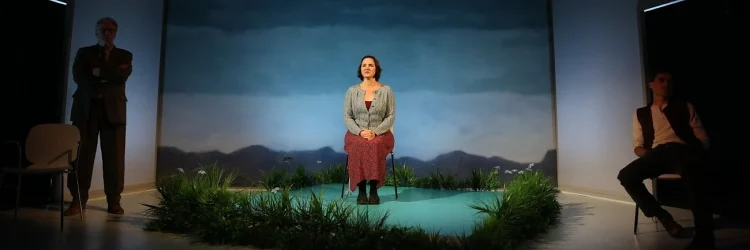Review of Keen Company's Molly Sweeney at Theatre Row
In Keen Company's production of Brian Friel's Molly Sweeney there is a mighty tale to tell. As the title indicates, this play is her story. Molly (Pamela Sabaugh) is at the center of it, while the planets in orbit around her are affected by her fate. Frank (Tommy Schrider) has been her husband of some years. He is a fanciful man with a wandering heart. Projects pull him from place to place, and, until he met Molly, he was not much interested in locating himself. Mr. Rice (Paul O'Brien) is the surgeon who tries to help. Molly, you see, is blind.
What needs to be helped is Frank's idea that Molly's eyesight can be restored. For all intents and purposes there is a thought that Molly is Frank's latest project. Her health is his latest fancy. Mr. Rice sees an opportunity to elevate his career in the eyes of his colleagues (one of whom ran off with Rice's ex-wife).
Both men acknowledge that this is an independent woman who is experiencing all life has to offer through every other sense other than sight. Molly herself tells the story of her father's gardening lessons every night after work. The man refused to send her to a school for the blind because of the cost that he could indeed afford. Her mother was in and out of mental institutions, so Molly's world became her own construction, and one in which she was quite comfortable.
Friel makes clear to us that the issue here is the threat to Molly, whether the operations succeed or not. How will a blind person (she could see shadows and some light) handle her life when she is literally invaded with new information. And not simply new information, but a new relationship with her doctor and her husband. It is a delicate situation that eludes most of us, and Friel's pen treats it with the precision needed in order to pull us into this unknown territory.
Less successful is the production itself. These three actors seem to be in different worlds in the literal sense. Their accents are inconsistent, vague and actually change over the course of the performance. They hardly sound like they are from the same country. My friend made an excellent observation: "They aren't throwing away anything." Indeed, not. Every word was parsed out with equal weight and attention. This is not how Irish folk speak. Often times I don't care what the topic is because I am ready to soak up the rhythm and the beauty of the Irish accent. The music of it. The lilt. Sounds hokey, I know. But that is the truth of it, and when that element is missing, as it is here, the thing goes flat.
In addition, Ms. Sabaugh could hardly be heard in the tiny space at Theatre Row, and for some reason it appeared that she was directed to look at us, when this character was supposed to be blind. I assumed that she was speaking from a future vantage point when she had sight. But I soon learned that the sight yearned for never arrived exactly as promised. So an odd choice there.
All in all, this production sails across the surface of the tale, when what Mr. Friel offered was a chance to go deep.
(Photo by Carol Rosegg)
Originally published on
